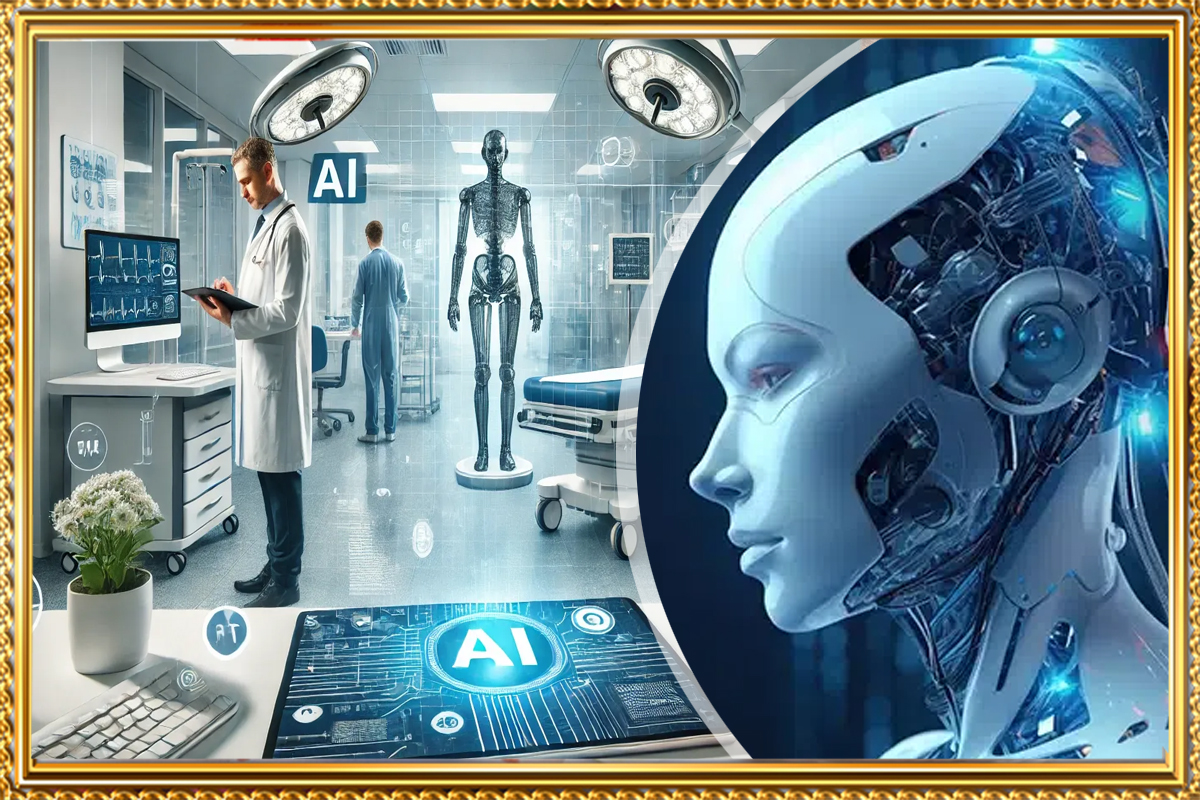How AI in Medical Records: Simplifying Healthcare Management

Artificial Intelligence (AI) is transforming the medical field, offering groundbreaking applications in medical records management, diagnostics, and precision medicine. Discover how AI contributes to better healthcare delivery, its challenges, and its potential to shape the future of medicine.
The Role of Artificial Intelligence in Medical Records: AI’s capabilities in data processing, pattern recognition, and predictive analytics have found significant applications in healthcare. Among these, managing and utilizing medical records efficiently is a standout area.
Applications of AI in Medical Records
How Are Medical Records Stored?
Positive Aspects of AI in Medical Records
Challenges and Negative Aspects
Future of Medicine in AI’s Era
Advanced Applications of AI in Medical Records
Ethical Considerations in AI-Powered Medical Records
Enhancing Patient-Doctor Interaction
Potential Challenges
Future Trends
Frequently Asked Questions (FAQ)
CONCLUSION
Applications of AI in Medical Records
- Data Summarization: AI algorithms can summarize medical records, extracting crucial details like patient history, recent treatments, and lab results. This saves healthcare providers time and ensures no critical data is overlooked.
- Disease Prediction: AI systems use medical records and other data sources to predict potential health issues before symptoms manifest. For example, predictive models analyze genetic, lifestyle, and clinical data to estimate the likelihood of conditions such as diabetes or heart disease.
- Enhanced Diagnostics: AI-powered tools can review patient records and suggest possible diagnoses, cross-referencing symptoms and medical history with vast medical databases.
- Personalization in Medicine: AI facilitates precision medicine by tailoring treatments to individual patients. For instance, it can recommend specific medications based on a patient’s genetic profile and medical history.

How Are Medical Records Stored?
Medical records are stored digitally in Electronic Health Record (EHR) systems.
- These systems house vast amounts of patient information, including medical history, diagnoses, medications, immunization dates, and test results. AI enhances these systems by enabling faster access, organization, and analysis of data.
Positive Aspects of AI in Medical Records
- Improved Efficiency: AI reduces administrative burdens, allowing medical professionals to focus more on patient care. Automating repetitive tasks like data entry and record retrieval saves time and resources.
- Enhanced Accuracy: AI minimizes human errors in medical records, ensuring accurate documentation and analysis.
- Better Patient Outcomes: With predictive analytics, AI can anticipate potential health issues, enabling early interventions and improved patient care.
Challenges and Negative Aspects
- Data Privacy Concerns: Storing sensitive medical data digitally raises concerns about security and privacy breaches. Robust cyber security measures are essential.
- High Implementation Costs: Integrating AI into healthcare systems can be costly, making it less accessible for smaller practices or developing regions.
- Dependence on Data Quality: AI’s performance heavily relies on the quality and completeness of medical records.
- Risk of Over reliance: Excessive reliance on AI could reduce the human element in healthcare, potentially impacting patient-provider relationships.
Future of Medicine in AI’s Era
- Opportunities: AI’s ability to process and analyze vast datasets offers the potential to: 1. Develop innovative treatments. 2. Streamline clinical trials. 3. Improve healthcare accessibility.
- Role of Medical Professionals: Healthcare providers should: 1. Stay informed about AI developments. 2. Acquire basic knowledge of data processing and AI mechanisms. 3. Collaborate with AI developers to ensure systems address real-world challenges.
Advanced Applications of AI in Medical Records
- Natural Language Processing (NLP): AI leverages NLP to interpret unstructured data in medical records, such as doctor’s notes, discharge summaries, and patient narratives. This allows for more comprehensive data utilization.
- Integration with Wearable Devices: AI can integrate EHR systems with data from wearable devices, offering real-time updates on patient health metrics like heart rate, glucose levels, and activity patterns.
- Remote Monitoring and Telehealth Support: AI-powered systems enable remote patient monitoring by analyzing EHR data in conjunction with telehealth platforms for early detection of health deteriorations.
- Clinical Decision Support Systems (CDSS): AI assists clinicians in making evidence-based decisions by integrating patient data with clinical guidelines, research, and drug interactions.
Ethical Considerations in AI-Powered Medical Records
- Bias in Algorithms: AI systems trained on biased datasets may lead to unequal healthcare outcomes. Ensuring diversity in training data is critical.
- Regulatory Compliance: Adhering to standards like GDPR and HIPAA ensures ethical use of medical data.
- Accountability: Determining responsibility for AI-driven decisions in healthcare scenarios is essential for ethical practice.
Enhancing Patient-Doctor Interaction
- AI can streamline administrative tasks, allowing doctors more time for direct patient interaction, thus enhancing trust and care quality.
- Chat bots powered by AI can provide patients with 24/7 access to basic medical advice and record updates, improving engagement.
Potential Challenges
- Interoperability Issues: Integrating AI systems with existing EHR platforms can be technically challenging due to varying data standards.
- Resistance to Adoption: Healthcare professionals may resist adopting AI due to lack of familiarity or fear of job displacement.
- Continuous Monitoring and Updates: AI systems require regular updates to incorporate the latest medical knowledge, which can be resource-intensive.
- AI and Research in Healthcare: 1. Drug Discovery and Development: AI accelerates drug discovery by analyzing molecular and genetic data to identify potential drug candidates.
- 2. Precision Public Health: By analyzing population-level data, AI helps design targeted interventions to address health disparities.
Future Trends
- Explainable AI (XAI): Efforts are being made to ensure AI systems provide transparent reasoning for their decisions, fostering trust in medical applications.
- AI in Emergency Care: AI is being used in emergency care settings to prioritize patients based on severity, ensuring timely interventions.
- Blockchain Integration: Combining AI with blockchain can enhance the security and traceability of medical records.
- Predictive Population Health Management: AI can predict healthcare trends within populations, aiding in resource allocation and policy-making.
- AI for Mental Health: AI tools are being developed to analyze behavioral patterns from medical records to identify and treat mental health conditions.
Frequently Asked Questions (FAQ)
- Will Artificial Intelligence Help the Medical Profession? Yes, AI enhances efficiency, accuracy, and patient outcomes, making it a valuable tool for healthcare professionals.
- Can Artificial Intelligence Replace Medical Practitioners? AI cannot replace the expertise and empathy of human practitioners. Instead, it complements their work by providing insights and automating tasks.
- How Far Can AI Go in Medicine? AI’s potential in medicine is vast, from predicting diseases to developing personalized treatments. However, its full integration depends on overcoming ethical, technical, and regulatory challenges.
- How Do We Know AI Is Safe for Medical Use? Rigorous testing, validation, and regulatory approvals ensure AI systems meet safety and ethical standards before implementation.
- Can AI Summarize Medical Records? Yes, AI-powered tools can effectively summarize medical records, highlighting relevant patient data for quick reference.
Programming Languages for AI Projects in Healthcare Python, R, and Java are popular choices due to their robust libraries and frameworks for machine learning and data analysis.

Conclusion: Artificial Intelligence is revolutionizing the healthcare industry, especially in managing medical records. While challenges like data privacy and implementation costs exist, the benefits far outweigh the drawbacks. By embracing AI, medical professionals can enhance patient care, streamline processes, and pioneer the future of medicine.














Post a comment